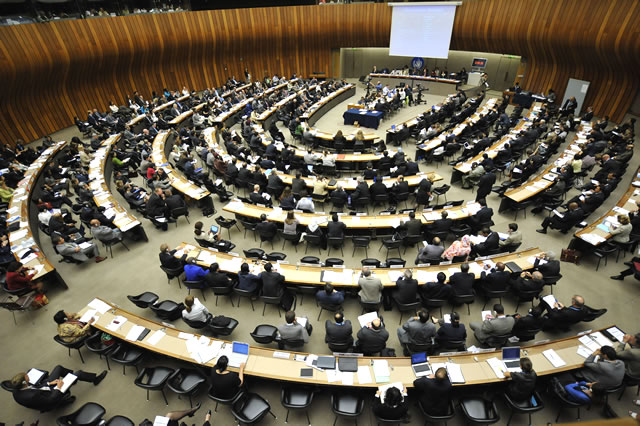As earlier posts in this series have noted, the UN Human Rights Council’s decision earlier this year to explore a binding treaty on business and human rights is a potential turning point in international efforts to ensure state and corporate accountability. But success is far from assured, and depends in no small part on more effective dialogue and coordination between states and other actors.
The initiative by states in the global south to begin discussions on a new legal instrument on business and human rights has received strong resistance and apprehension from numerous states concentrated in the global north. Unfortunately, the debate around whether to push for a binding instrument, or continue to focus only on implementation of the UN Guiding Principles (UNGPs), has become very polarized. States and other stakeholders have focused strongly on the differences between the two initiatives, and have reached a point where a perception of mutual exclusivity has been created. I fear that the polarization of the debate comes at a time when coordination and harmonization of efforts are needed more than ever.
The push for a binding instrument stems largely from frustration at the lack of concrete progress in implementing the UNGPs, especially in relation to the third pillar (access to remedies). While stakeholders across the globe have embraced the UNGPs with exceptional willingness and exposure, their rapid ascension to become the most authoritative instrument in the business and human rights discourse may also be their greatest disadvantage. It is clear from engagement with victims of corporate human rights abuses and affected communities that the UNGPs have created, for some, unrealistic expectations of how this framework can assist those in desperate need of redress. For others, the UNGPs are viewed as just another corporate code on human rights that companies can claim to adhere to without actually taking the steps needed to address the negative impacts of their practices on the ground.
It is important to bear in mind that Professor John Ruggie, the architect of the UNGPs, has stated numerous times that the UN framework should be seen as the first step in broader efforts needed to ensure corporate respect for human rights around the world. The UNGPs do not create any new legal obligations, and focus to a significant extent on reaffirming existing state obligations under international human rights law. Any failure to facilitate change is therefore largely due to the failure of states to act. It is unfair and incorrect to assign blame to shortcomings of the instrument itself.
If we accept that the UNGPs are a first step in a longer road towards greater accountability and respect for human rights amongst all business enterprises, and furthermore that we should continually explore the way forward from a rights holder-based perspective, surely it does not benefit anyone to compare or even contrast the parallel processes pertaining to the UNGPs and new binding standards for business and human rights. The development of any treaty is a strenuous, technical and time-consuming process, which will take years to conclude. By no means, however, should discussions around a business and human rights treaty prevent or even slow down work being done around implementation of the UNGPs. In fact, effective and ongoing dialogue between the two processes could benefit both an implementation framework related to the UNGPs, and the normative and institutional framework of a treaty.
Neither of the two processes should aim to alienate the other side. A treaty that would be ratified only by states from the developing world would be of limited use, and may easily have a similar fate to the International Convention on the Protection of the Rights of All Migrant Workers and Members of Their Families. This Convention focuses on the duties of migrant-receiving states, and despite having been around for close to 25 years, has only received 47 ratifications – mainly from migrant-sending states. There is a direct parallel to be drawn, and a clear indication that for any attempt around a binding instrument on business and human rights to be effective, both home and host states of business entities need to be on board.
While effectively streamlining initiatives and completely avoiding duplication of work at the international level is a near impossible task, it is clear that coordination and communication at all levels and with all relevant actors is crucial to making progress. Existing standards, principles, and mechanisms for redress on business and human rights are fragmented, and vague from a legal point of view. This situation is exacerbated by the uncertainty in the international arena, with different global and international bodies developing a myriad of instruments and initiatives, once again confusing both rights holders and duty bearers.
I have personally witnessed representatives from states, international organisations, the corporate sector, and civil society making declarations reflecting a lack of clarity about their commitment and support to business and human rights processes and procedures. These declarations raise serious issues around the legal bases and mandates on which different role-players act – all because of a lack of communication and coordination.
It is therefore my suggestion that now is the time to redouble efforts to ensure more effective communications and engagement between all actors as a new phase in the evolving business and human rights agenda begins. All of us working in this area should seek to foster constructive dialogue and encourage greater harmonization of efforts aimed at developing a better, safer, and more robust human rights environment for all business activities, be it binding or non-binding. Let the aim bind us together, rather than the means divide us.





























How should businesses respond to an age of conflict and uncertainty?
As 2024 began, European Commission President Ursula von der Leyen aptly summed up our deeply worrying collective moment. As she put it, speaking at the annual World Economic Forum in Switzerland, we are moving through “an era of conflict and...
26 March 2024 | Commentary
Commentary by Scott Jerbi, Senior Advisor, Policy & Outreach, IHRB